7 Industries That Look for Scrum Master Certification in 2021
Unemployment uncertainties became the new normal in 2020. Almost every sector and industry witnessed layoffs and downsizing. Amid this mayhem, one career path whose demand kept increasing is that of a Scrum Master. More and more industries are welcoming Scrum masters for their ability to finish complex projects on time without compromising on quality and manage teams seamlessly to achieve better.
Here are seven industries that are looking for certified Scrum masters in 2021. If you are looking to build a career as a Scrum Master, this is the best time. Ranging from manufacturing, IT, technology to financial institutions and health care, companies using Agile Scrum have increased massively.
Organizations of all sizes, from corporate multinationals to startups and mid-and small-scale traditional companies are hiring certified Agile masters Before we get into the details of industries looking for certified Scrum masters, let’s re-examine the basics.
Who is a Scrum Master?
A Scrum Master is an Agile professional whose main responsibility is to promote and support the Scrum framework in an organization. They do so by helping the team understand Scrum values, theories, best practices, and implementation.
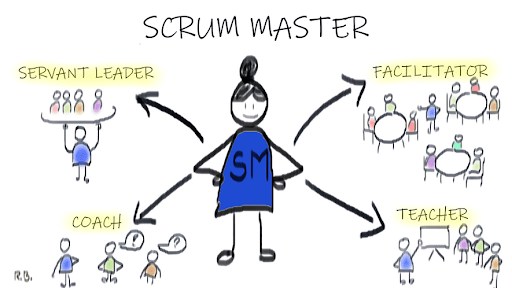
Source: Letsscrumit
A Scrum master operates with a specific mission of facilitating the seamless implementation of Scrum and Agile to optimize the value the Scrum team creates and develop high-performance work culture.
The role of a Scrum Master is extremely interesting and challenging at the same time. While you can learn the roles and responsibilities on your own, it would take you a long time. Instead, a Scrum master certification can help immensely.
Getting a Scrum master certification in 2021 can help you become an expert in implementing Scrum best practices. For companies that use Scrum, being Scrum master certified is a validation that you know the fundamentals, theories, and concepts of successful Scrum framework implementation.
The next step is to understand why employers and organizations hire Scrum Masters.
Why Do Businesses Need a Scrum Master?
Organizations across all industries globally are hiring Scrum masters because they are experts in handling challenging tasks. They address complex issues during the lifecycle of a project, ranging from motivating, leading, and training the team to respect the timelines; coordinating with the stakeholders, product owners, managers, and developers; and onboarding project teams.
A Scrum master acts as a bridge between a product/business owner to facilitate accountability at every level. They ensure that everyone is on the same page and help the team meet deadlines and deliverables within budget.
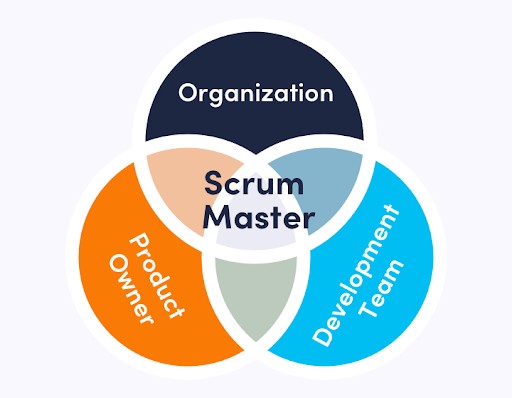
Source: Selleo
A company’s motive for hiring a Scrum Master is to add a problem solver to the team with experience in handling complex pain points. This allows the developers to concentrate on the work without getting distracted.
What Is the Salary Range of a Scrum Master Across Industries?
Considering the significance of hiring a certified Scrum Master, the Scrum master salary range is extremely good globally. However, the salary depends on different factors such as the demand for Scrum masters in a particular country and the overall economy.
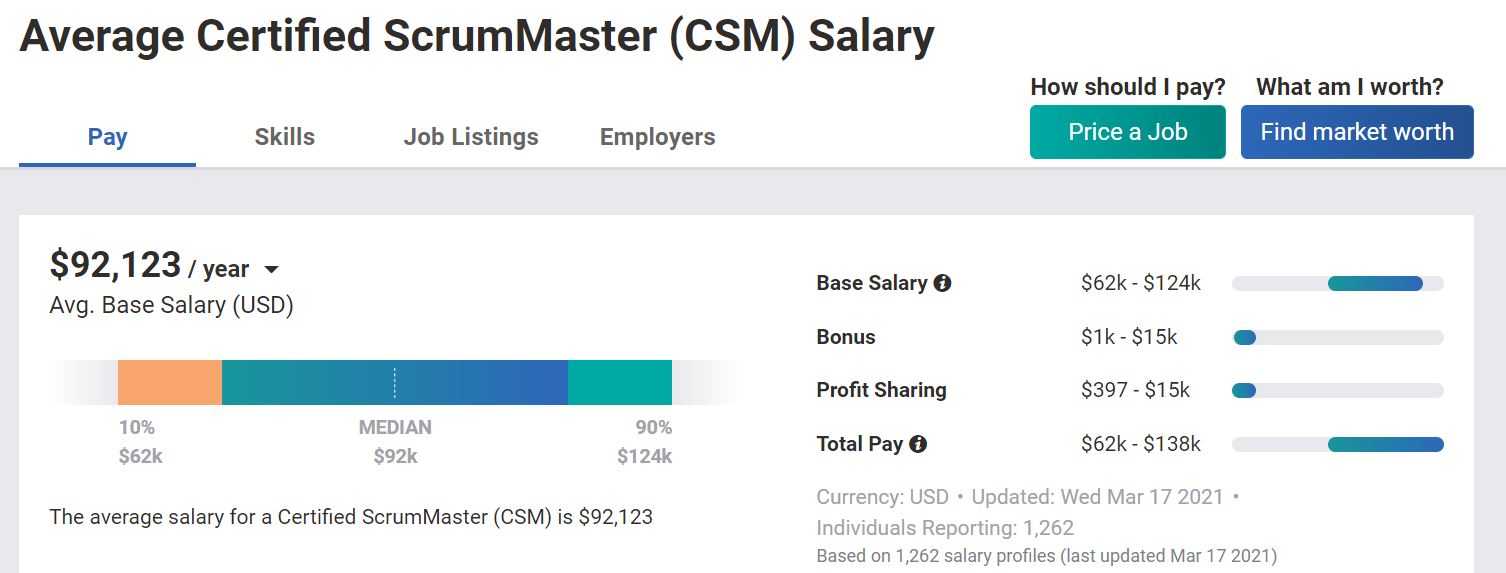
Source: PayScale
Whether you’re just starting as a certified Scrum master or exploring the role in the next step on your professional journey, certified Scrum master salaries are usually higher than your non-certified peers.
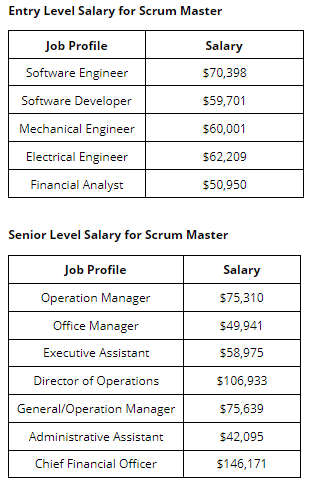
Source: GreyCampus
Now, you are familiar with the salary of certified Scrum masters, the next section covers the seven industries that look for Scrum master certified professionals in 2021.
Which Are the 7 Industries Looking for Scrum Master Certification in 2021?
The importance of a Scrum master is undoubtedly more in some industries, such as the IT sector. With the rising awareness about Scrum master efficiency, several other industries are jumping to hire certified Scrum masters in 2021. Here are some of the companies that use Scrum.
1. Financial Services (Insurance, Retirement Planning, and Investment Firms)
Today, a host of technologies, including apps, platforms, and web portals accompany financial services. With users shifting to financial technologies that are accessible via their smartphones and from the convenience of home, financial services are becoming the foremost industry using Scrum.
Scrum masters drive the team to success by letting them manage and fix mistakes in the initial stages before they become blunders causing a heavy loss. Certified scrum masters serve financial organizations and their customers by identifying and fixing risks early thereby saving money and other assets.
Successful financial institutions know how to use Scrum masters and Scrum teams for effective launching and developing products.
With a Scrum Master’s help, the team can easily build a well-organized product backlog, and the organization can learn from the mistakes that were first in the backlog. Once the team learns the lesson, the Scrum master can sideline it from the backlog. This keeps the backlog current and on point.
2. Product Development (Light Manufacturing, Heavy Industry)
Scrum manufacturing is becoming increasingly popular in light manufacturing and heavy industry. A Scrum Master can implement Agile practices for product manufacturing by identifying production errors much earlier in the supply chain. If detected later, it can be extremely costly to investigate, mitigate, and fix.
A Scrum Master can deter a manufacturing firm from delivering defective products to customers to avoid bad experiences. The result is improved customer experience, leading to increased revenue and a healthy bottom line.
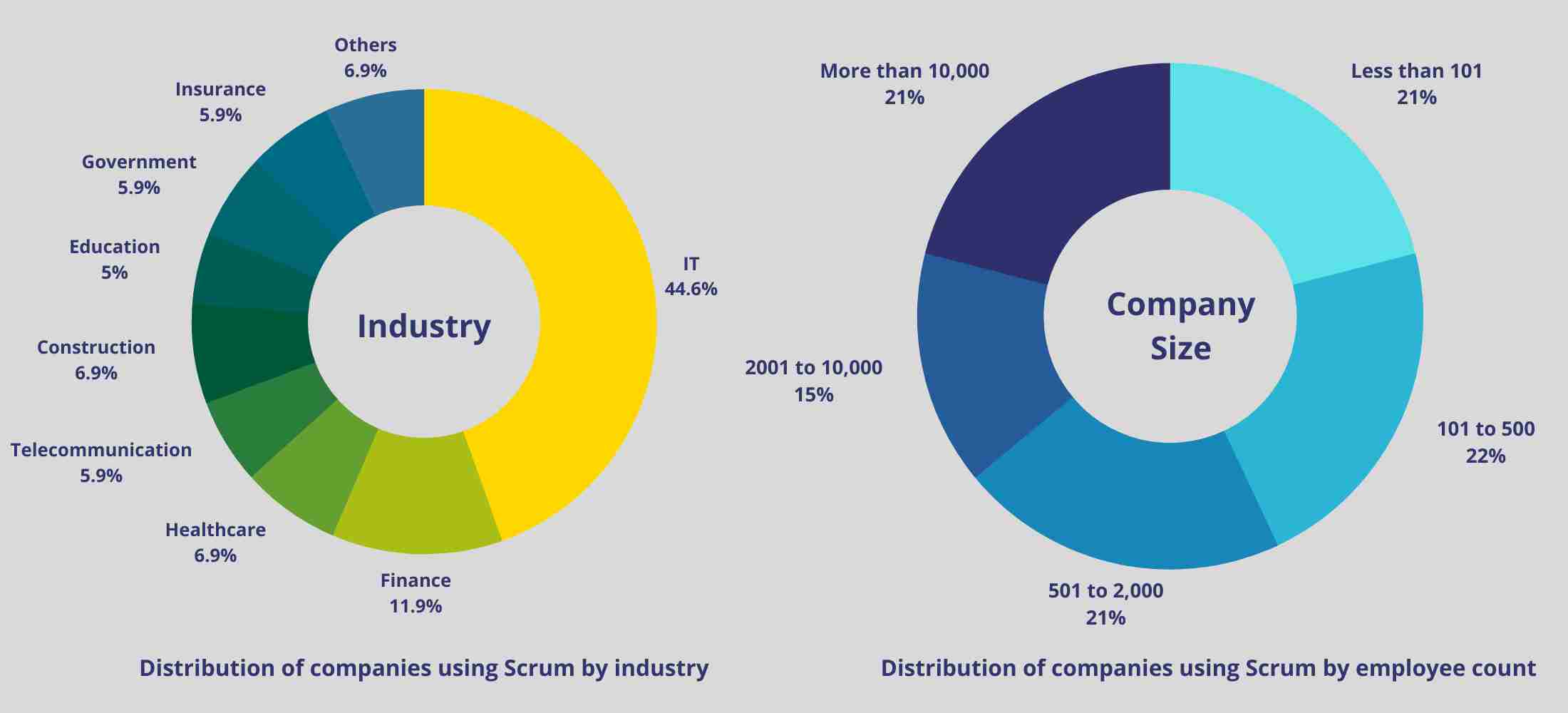
Source: GreyCampus
3. Construction
Materials, user requirements, stakeholders, and competition are some crucial factors of the construction industry that are consistently evolving. They can create a huge gap between the current managerial perspective on how to execute construction projects and how to manage them to optimize efficiency.
Contractors are embracing Scrum frameworks and Agile project management rapidly for better project and product management. This, in turn, leads to improving the performance of their teams, boosting their competitiveness, and optimizing the value-added for their clients.
Scrum masters have the potential to design and plan a construction firm’s departments that optimize the quality of the deliverable and reduce operational costs.
4. Advertising and marketing
Advertising and marketing are two of the industries where the demand for Scrum Masters has risen rapidly. A Scrum master helps advertising and marketing agencies to develop cross-functional teams harmoniously and organize their tasks within a well-groomed backlog that keeps everyone focused on specific priorities.
Daily meetings of the Scrum framework allow for constant feedback and seamless collaboration that help marketing and advertising firms deliver projects on time. Also, coordination between the product manager and stakeholders helps the latter to raise their concerns regularly and keep an eye on the project’s progress.
5. Consulting firms
Consulting firms look for certified Scrum masters because they act as value drivers not only for the teams but also to convince the clients to return for even bigger contracts by delivering existing projects successfully.
A Scrum master’s key responsibility in a consulting agency is to work with multiple Scrum teams for optimizing the productivity and quality of the deliverables.
6. Government offices
Government offices are well-known for having time-consuming and costly processes. By using traditional contracts focusing on misleading milestones, government offices have lost millions. Involving a certified Scrum master in a government setup can bring the delivery back on track and make meaningful adjustments by determining the potential loopholes in advance.
Implementing the best Scrum practices in reviewing the backlog and involving stakeholders for approvals at regular intervals helps in creating a win-win strategy for stakeholders, vendors, contractors, and the organization.
7. Disrupters (Airbnb and Uber, for instance)
Whether they’re product or service companies working on disruptive technologies, these companies must have constant forward motion. They are in a constant search for hiring certified Scrum masters to build their products, keep upgrading them, and adjust them per user feedback.
Flexibility and adaptability are the two crucial driving forces for disruptors that are also integral parts of the Scrum framework. An experienced Scrum master helps these drastically evolving businesses to determine what’s working and what’s not, which paves the way for speedy progress and rapid growth.
Wrapping up
It’s not surprising that companies are using the Agile Scrum framework for delivering projects within established timelines and budgets without compromising on the quality of the deliverables. Given the Agile-driven environment, organizations are hiring Scrum masters for a seamless transition to the Agile economy from the conventional waterfall methodology.
If you want to kickstart your Scrum master journey, GreyCampus is your go-to option as a leading provider of Certified Scrum Master (CSM) instructor-led training. Choosing GreyCampus as your Scrum training partner will not only help you gain expertise in the Scrum framework but will also prepare you to crack the top Scrum master interview questions easily. What a better way to land the most lucrative Agile jobs in 2021.
Want To Land High-Paying Scrum Master Jobs? Consider Getting Certified Today!
